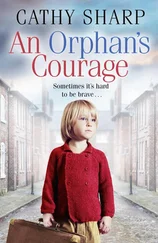1 ...8 9 10 12 13 14 ...23 She fingered the silver cross she always wore as a sign of her faith and pondered the injustices of what at times seemed an uncaring world. It was not for her to make judgements. Her duty was to serve and she did her duty to the best of her ability.
‘Help me not to fail, I beg you, Lord. Prevent me from the sin of pride and give me the grace to serve with humility.’
Sometimes, Sister Beatrice was weighed down by her fear of failure. When faced with ignorance, poverty and cruelty, she wondered if she could ever do enough to make a difference, or was she like the little Dutch boy who had stood with his finger in a hole trying to keep out the flood of the sea? Perhaps God had His purpose for her and to do His will she must be humbled.
This would do no good at all!
Smothering a sigh of annoyance, she reached for the dark grey coat that would cover her habit. Having reached the age of forty-nine, she no longer glanced at her reflection, other than to make sure her cap was straight and her uniform worn as precisely as she demanded from her staff. Once, she’d been considered attractive, more than that if the truth be told, but beauty was skin deep, and in Beatrice’s opinion only brought unhappiness.
‘Sister Beatrice, may I have a word with you please?’
She turned, frowning in annoyance as the pretty young woman came into her office. ‘Staff Nurse Michelle, what may I do for you? I am in a hurry …’
‘Oh, are you going out?’
‘It is the monthly meeting and I’m already running late so make it quick.’
‘One of the new inmates is running a fever. I thought you ought to know.’
‘You had better put them all in the isolation ward just in case.’ Sister Beatrice picked up her battered but once-good leather bag and her gloves. ‘I shall visit them there when I return. Surely you can cope, Nurse?’
‘Yes, of course.’ Staff Nurse Michelle looked as if she wanted to sink, but raised her chin. ‘I thought you should know. I shall keep an eye on them myself just in case they have contracted something infectious.’
‘Well, you did the right thing, but I am in a hurry. Get on with it!’
The girl scuttled, making Beatrice smile grimly. Staff Nurse Michelle was usually reliable, as she ought to be, having trained as a nurse at the outbreak of war and done service in both civilian and military hospitals. She shouldn’t be so nervous of being reprimanded, but she was still fairly new to St Saviour’s and would get used to their ways in time. Perhaps she was in awe of her superior, because she wore the clothes of a nun?
Did her nurses think she was too strict because she tried to follow her conscience and do the work of the Lord? Was she too set in her ways, too accustomed to the years of suffering to accept that things were changing? At times her uncertainty pricked at her, but she took refuge in her faith. God would provide.
Sister Beatrice had suffered enough reprimands during her years of training at the convent infirmary. Her sin had been one of pride and she feared that she had been a disappointment to Mother Abbess many times, before she learned to control her anger and her pride. She’d worked many years with the sick and dying in the infirmary before she’d been permitted to care for the children. And it was only by special dispensation that she had been allowed to take up her position here, and because the Church wished to have a representative in a position of authority. It was the Bishop’s intention that she should maintain the strict moral discipline he believed desirable. Too many children’s homes had been called into question in recent years and she’d been told in confidence that it was her strong sense of discipline that was needed here.
‘With you at the helm I am sure our standards will not slip, as they have at other institutions, Sister Beatrice. I am relying on you to remember the old values. Children need to learn what is right and proper, but they must also be protected and cared for.’
‘Spare the rod and spoil the child?’
‘Exactly.’ The Bishop smiled at her. ‘I know I can rely on you to see that St Saviour’s does not fail in its duty to these poor ignorant children, Sister.’
‘If God grants me strength I will do what I believe to be right, my lord.’
‘I know we can trust you, Sister Beatrice,’ Mark Adderbury had told her later. ‘I’ve watched you working with sick children and I know you to be stern but compassionate – exactly the qualities needed. You will be their guardian and also their champion.’
Sometimes, she wondered if she’d been a fool to be flattered by Mark Adderbury into taking on the position of Warden. He was such an eminent man, so well respected, and charming. His smile could make most women melt and even she – who ought to know better – had experienced a few heart flutters when he smiled at her.
They’d met at the children’s hospital, which was part of the Church-run infirmary, where she had been the Sister in charge of the traumatic cases: children who had been the victims of violent abuse, children who often had lost the power of speech and would only stare at the wall by their bed. Mark Adderbury had been the visiting specialist and she’d admired his professionalism, his manner with the young patients, and the success rate he’d had amongst what had been thought to be hopeless cases. Of course he had as many failures as successes, but even one child brought back from the hell of despair was cause for celebration in Beatrice’s eyes.
Walking along the busy London street, her eyes moved over dingy paint and dirty windows. The narrow lanes about Halfpenny Street were, she supposed, marginally better than those many of the children came from in that the gutters were not choked with filth. When the charity – formed by several well-meaning persons of influence and wealth, including a Catholic Bishop and an Earl, though the latter did no more than contribute to the funds and allow his name to be printed on their headings – had bought St Saviour’s for a song, it had cost a small fortune to make it habitable again. However, its situation made it ideal for taking in the orphaned or mistreated children from the surrounding slums and giving them a safe home where they would be fed, cared for and given a new start in life. Although various council-run homes existed, and of course Dr. Barnardos had places all over London and the rest of the country, there were none quite like St Saviour’s, in her opinion. Everyone seemed intent on getting the children out of the city, sending them to scattered locations in the country, where they would lose touch with any friends they might have and would eventually lose their London identity. Here they gave their children individual attention, with each child loved and cared for, which wasn’t always the case in other homes. Beatrice liked to think that it was a place of hope for those poor forgotten children who might otherwise have lived on the streets.
St Saviour’s was the first place a harassed council and busy police force thought of when needing somewhere to place these children. Some would move back when their families were able to cope; some would go to new homes with kind people who took them in and cared for them. The worst cases sometimes went into specialist homes because their minds or bodies were beyond repair but St Saviour’s took as many children as they could squeeze into their premises. Because she knew only too well how desperately the home had been needed, Sister Beatrice could not truly regret having given up her life at the Catholic convent, which was situated in a quiet suburb on the outskirts of London, though she sometimes missed the peace of the evenings spent in prayer or quiet contemplation. She’d been convinced of her vocation and content to do the work God had given her; it was only since coming to St Saviour’s that she had sometimes wondered if she was strong enough for the task. However, Mark Adderbury was right when he said that not all children in need were ill. Many were simply undernourished and ill-treated, and it was these that St Saviour’s had mainly been set up to help because the established homes were overflowing and some had closed during the Blitz and taken their children out of London. This particular area had been chosen because it was at the heart of one of the poorest in the city, and would provide an instant refuge and in some cases a home for life.
Читать дальше












